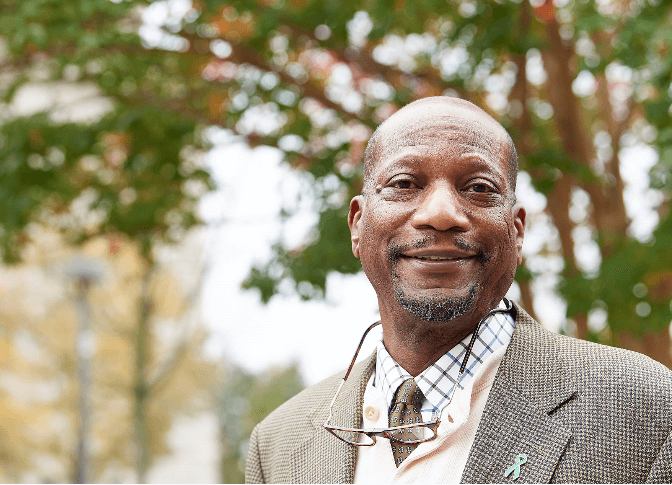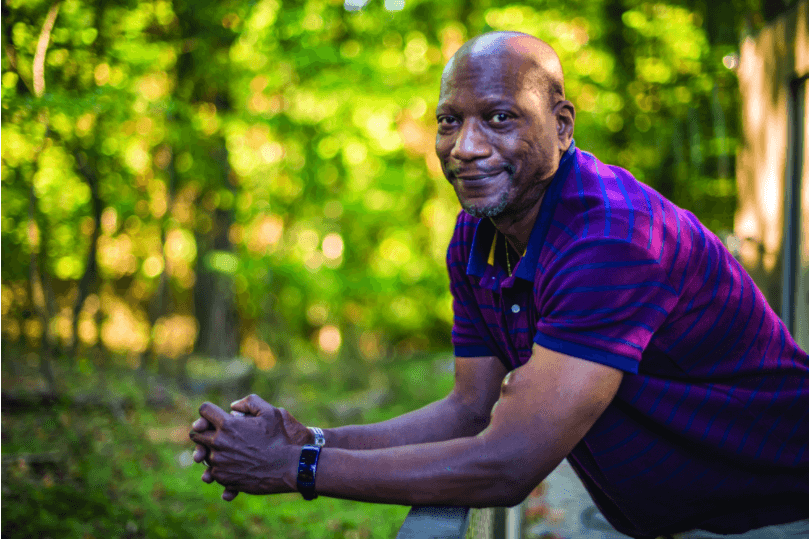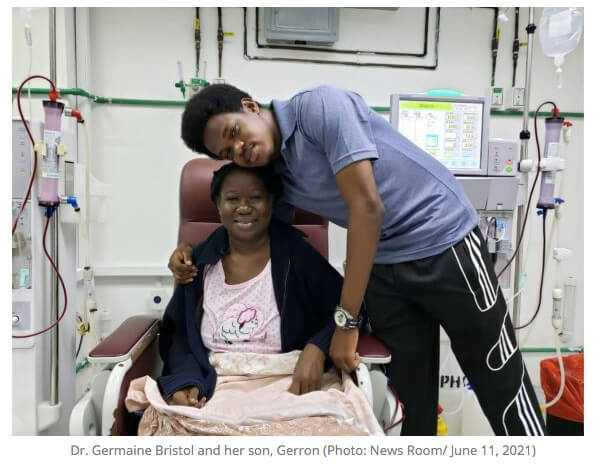“Your kidneys aren’t working anymore.” When I heard these words back in 2009, the only thing I knew about my kidneys was that I had two of them. A few days later, I woke up after surgery with a plastic tube sticking out of my chest. The tube ran straight into my heart so I could begin emergency dialysis.
Now, I consider myself to be a pretty smart guy, but I wasn’t smart about taking care of myself. Years of bad habits like smoking, drinking too much alcohol, being overweight, not exercising, and skipping doctor’s appointments had finally caught up to me. And I didn’t know much about how the human body works. For example, even though the doctors told me that I would need to be on dialysis for the rest of my life, I still thought that my kidneys might magically start working again on their own.
The hour-long commute to the dialysis clinic was exhausting. I was so anemic that I had to stop every half-block or so during the walk from the subway station to the clinic so I could rest and build up enough strength to walk some more. When I arrived at the clinic for my treatment, I wanted to get out of there as soon as I could because I was miserable the entire time there. Eventually, I started to make up reasons to miss dialysis, and that put my life in even more danger.
In the spring of 2010, I was called into a meeting at the clinic to talk about why I was skipping dialysis, and at the end of the meeting a nurse said “we’re here to help you, but you have to do your part or you may not be around much longer.” When I got home a few hours later, I looked at myself in the bathroom mirror and thought “They’re right. This is on you. And you can do this.” I remember that moment like it was yesterday.
Instead of being angry about a part of my life that I couldn’t control, I started to focus on the parts that I could control, like going to dialysis. Doing the right things every day was hard, but in a few weeks, I started feeling better, which led me to believe that I might make it if I kept up the hard work. Besides, what did I have to lose by trying?
I started to read about how dialysis works, and one thing I learned right away was that kidneys do their job a lot better than dialysis machines can. I also learned that a kidney transplant was the best treatment for someone with kidney failure, but the thought of receiving an organ from someone else made me uneasy.
Every week in the clinic, my social worker and I would talk about my progress, as well as my hopes and dreams of getting healthy and getting back to work. Sometimes, she would encourage me to get evaluated to see if I could get a kidney transplant, and when I told her that I wasn’t interested she would say, “okay, but try to keep an open mind about it.” She gave me a handout with phone numbers for transplant clinics a few times, and each time I took the handout home and checked it against the last one she gave me to see if it had been updated. I guess I was keeping an open mind after all.
We also discussed living donation, but I didn’t want to ask my family or friends to donate a kidney because I was afraid of how they might react. I think that a lot of other people on dialysis who are thinking about a kidney transplant might feel that way, too.
My fear of getting a transplant didn’t stop me from reading about it. One of the first things that I learned was that I would have to take medications for the rest of my life to keep my body from rejecting the kidney. I also learned that there are thousands of people on the national transplant waiting list, and it might be years before I got a call from a transplant clinic. These facts weren’t very encouraging, and dialysis was working out pretty well after a rough start, so I didn’t change my mind about getting a transplant for a long time.
But attitudes can change!
In 2012, one day during dialysis, I said to myself “okay, it’s time to try something different.” The next morning, I dialed the number for the first transplant clinic on the handout. The person who answered wasn’t very friendly when I told her why I was calling, so I said “thank you very much,” hung up, and called the next number on the list. I wasn’t going to let one bad experience stop me.
Over the next three years I got tested to see if I could get placed on the waiting list for a kidney transplant at three different clinics and, believe it or not, the third one called me with an offer for a kidney the day after I was approved! Two days after that phone call, for the second time in my life, I woke up in a hospital with something new inside of me. This time, though, my future looked a lot better.

Today, a little more than five years after my transplant and almost 11 years after my kidneys failed, I look back on everything that I’ve been through in wonder and amazement. I’m sitting in the same bedroom where I used to make up excuses to miss dialysis. Right outside my room is the same bathroom where I looked in the mirror and decided that my life was worth saving. I’m still with my wonderful wife who, just like the nurse at my dialysis clinic, didn’t give up on me when I tried to give up on myself.
I call my transplanted kidney Hercules to recognize and honor the strength that that he gives me very single day. I think about my donor family’s kindness and generosity during their moment of deepest grief, and work hard every single day to make sure that their gift is never wasted.
Sometimes, you don’t think about certain things until you have to, and I never thought about organ donation until I needed a kidney. Today, I am living proof that organ and tissue donation can change lives in ways that people might never imagine.
And in case you were wondering, I am now a registered organ and tissue donor. I hope that my story will inspire you or someone you know to consider becoming an organ donor as well!
75% of those waiting for a lifesaving transplant in the greater New York City area are people of color. LiveOnNY is working to raise awareness about the power of donation to improve health outcomes multiethnic communities. To learn more, please visit LiveOnNY.org.

























